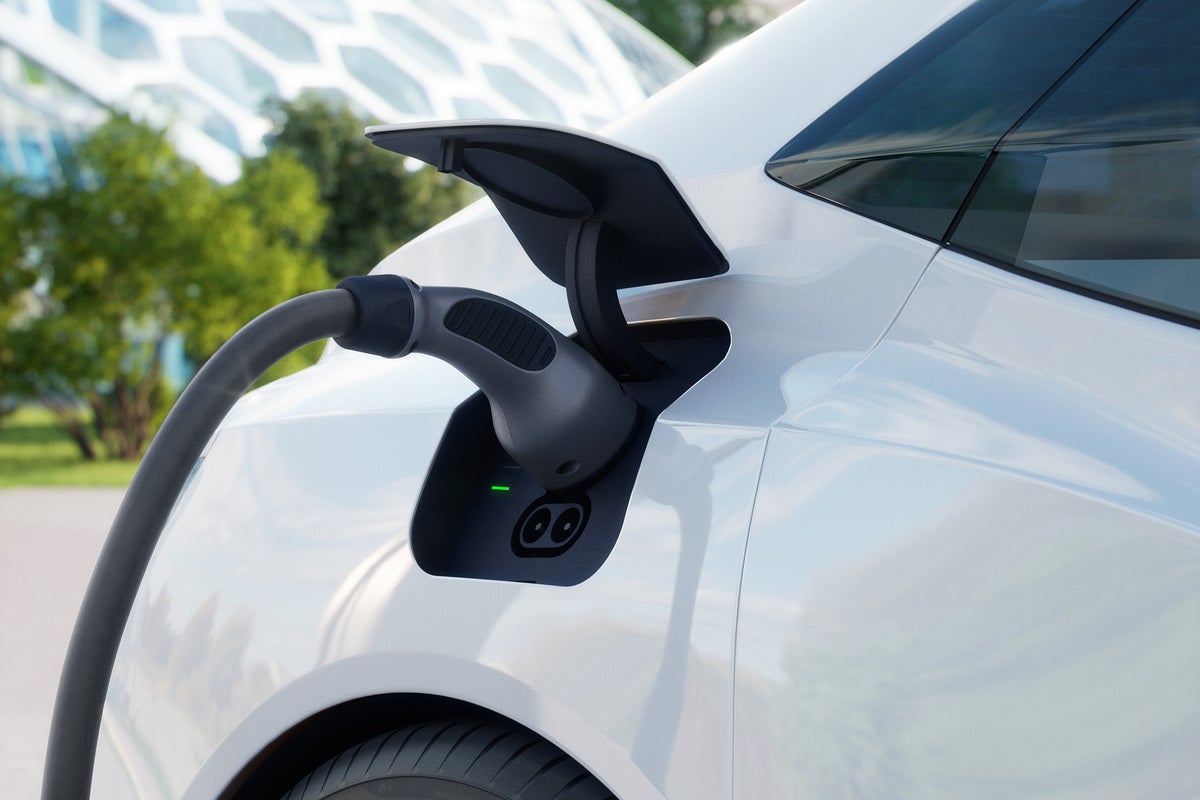The future is now: how semiconductors are driving the evolution of mobility
THE ARTICLES ON THESE PAGES ARE PRODUCED BY BUSINESS REPORTER, WHICH TAKES SOLE RESPONSIBILITY FOR THE CONTENTS

Infineon is a Business Reporter client.
Semiconductors play a critical role in driving the transformation to clean, safe and smart mobility by supporting decarbonisation and digitalisation.
The future of mobility is here, and it is being revolutionised by semiconductors. These tiny but powerful components are driving significant advancements in vehicle technology and paving the way for sustainable transportation systems.
During the groundbreaking ceremony of Infineon’s semiconductor facility in Dresden, Germany, German Chancellor Olaf Scholz described semiconductors as the “petroleum of the 21st century”. His statement highlighted the central role that semiconductors play in enabling various technologies and industries.
However, despite their significance, semiconductors often remain in the background while megatrends such as generative artificial intelligence, the metaverse, 5G, electric mobility, IoT and sustainability take the spotlight. Semiconductors remain the unsung heroes of the tech world, working behind the scenes to power and connect everything from electric cars and buses to trucks and automated vehicles.
In addition, semiconductors also contribute to the generation of renewable energy for the mobility sector, supporting technologies such as wind turbines and photovoltaic systems – thus making mobility greener, from well to wheel.
Infineon Technologies, headquartered in Neubiberg, Germany, is a global semiconductor leader in power systems and IoT. As one of the global leaders in this space, Infineon actively contributes to the shift towards sustainable mobility by driving innovation and progress.
Watch “The mobility talk” here.
Rethinking mobility
Given the evolving challenges faced by the mobility industry, it is imperative that we re-evaluate our approach to transportation, focusing in particular on the role of semiconductors.
In 2022, global energy-related CO2 emissions experienced a 0.9 per cent increase, amounting to 321Mt and reaching an alarming new record of over 36.8Gt. These figures were highlighted in a recent report by the International Energy Agency1 (IEA), which emphasised that the transport sector contributed to 22 per cent of global CO2 emissions in the same year, totaling 7.98Gt CO2. Within the transport sector, road vehicles accounted for approximately 75 per cent of these emissions.
With all this in mind, it is critical that we rethink mobility and prioritise environmentally sustainable and safe transportation options while allowing people to mix and match the most convenient means of transportation.
Public transportation, both at the local and long-distance levels, electric bicycles, scooters and mopeds, provide sustainable alternatives that alleviate traffic congestion and reduce emissions.
By implementing decarbonisation and digitalisation goals, we can transform and manage increasing global traffic, mitigate climate impact and contribute to a Net Zero economy.
Even more importantly, we must leverage state-of-the-art technologies and semiconductor solutions to reduce transport emissions and bring about a mobility transformation in the 21st century.

The soaring demand for semiconductors
The mobility industry is witnessing a significant surge in the demand for semiconductors, driven by continuous innovation, with startups, Tier 1 suppliers, and established OEMs creating new opportunities in transportation.
For instance, semiconductors are one of the fundamental building blocks of smart electric cars, driving 90 per cent of automotive innovations. Semiconductors play a vital role in developing advanced driver assistance systems (ADAS), connected cars and other vehicle systems that enhance safety, connectivity and overall performance.
To address the growing demand and future mobility requirements, the semiconductor supply chain is undergoing significant transformations. Wide-bandgap technology (WBG), such as silicon carbide (SiC) and gallium nitride (GaN), is emerging as a good alternative to conventional silicon-based power devices. WBG technology offers higher energy efficiency and power density, enabling advancements in various key applications such as onboard chargers or traction inverters.
Moreover, the industry has growth potential as we embrace mobility-as-a-service, a concept that extends beyond vehicle-sharing systems to autonomous shuttles, self-driving trucks and even autonomous aircraft. These autonomous vehicles rely on sophisticated semiconductor technologies, combining sensors, microcontrollers, connectivity solutions and AI to perceive their surroundings, make informed decisions and navigate safely. The automation of the mobility industry presents various opportunities that the semiconductor industry is well-equipped to handle.
The integration of semiconductors into electric vehicles is particularly remarkable, as their value surpasses the value of those in conventional vehicles. In 2022, the average value of semiconductors integrated into conventional vehicles stood at around $5002, while battery-electric vehicles (BEVs) commanded double the value, at approximately $1,0003. Looking ahead to 2028, the scenario has changed significantly, with a BEV already having an average semiconductor value of $1,5004.
Mobility transformation towards a clean, safe and smart future
Infineon is playing an active role in driving the shift towards clean transportation. With its expertise in power systems, the company is developing highly efficient power semiconductors that facilitate vehicle electrification, reduce reliance on fossil fuels and contribute to environmental protection. As per a report by Omdia5, Infineon has held the top position in power semiconductors for 15 consecutive years, solidifying its global leadership in the field.
In addition to power semiconductors, Infineon’s microcontrollers, such as the AURIX™ product family, contribute to the advancement of safer and smarter transportation systems. These microcontrollers enable essential features such as collision detection and adaptive cruise control, enhancing overall vehicle safety.
As digitalisation continues to shape the future, semiconductor solutions become instrumental in the development of smart and secure internet of things (IoT) applications. By leveraging state-of-the-art semiconductor solutions, Infineon has been able to facilitate the development of connected vehicles, intelligent transportation infrastructure and efficient logistics systems. With embedded security features and hardware-based solutions, these microcontrollers provide integrity and privacy to connected vehicles, fostering trust and reliability in new mobility solutions.
Infineon’s innovative semiconductor solutions are at the forefront of driving this transformative shift towards a clean, safe and smart mobility ecosystem.

Success stories demonstrate that the future is now
Let’s look at a few real-life success stories from Infineon that showcase how semiconductors are transforming the vehicles the world drives today. From advanced lighting systems and adaptive headlights to lightweight electric vehicles, semiconductors enable improved safety, efficiency and connectivity on the road. They also facilitate secure payment systems, fast-charging infrastructure and intelligent solutions for truck and logistics management.

In passenger cars, lighting is a critical aspect of microelectronics solutions. Nichia, in collaboration with Infineon, has developed a high-resolution micro-LED matrix solution. Found in modern cars from leading automakers, these matrix LED headlights provide precise light projection by dimming the illumination in the presence of oncoming traffic. Additionally, they project relevant information onto the road, benefiting other road users. This seamless communication between the vehicle and its surroundings significantly enhances safety and provides improved navigation and a safer driving experience for all.

In the freight sector, manufacturers are working on solutions to equip trucks with a digital ID for seamless identification and payment of services. Here, semiconductors again play a crucial role in enabling this functionality. New platform technologies and central user programs enable vehicles to autonomously handle payments for road tolls, electric charging and secure border control solutions, such as digital customs documents, without involving or interacting with the driver. All these factors ultimately streamline the administrative work, facilitate a convenient experience and lower the operating costs for transportation companies.

As the transition to electric vehicles gains momentum, a robust EV charging infrastructure becomes even more critical. Alpitronic has introduced wall-mountable ultra-fast charging stations suitable for residential areas and shopping centres. The HYC50 hypercharger, equipped with Infineon’s EasyPACK™ CoolSiC™ modules, offers two fast-charging ports capable of simultaneously charging two vehicles at 25kW or a single vehicle at 50kW. With minimal construction requirements and low noise levels, these charging stations facilitate convenient charging during daily activities such as shopping.
One country that stands out as a great example in the context of mobility-as-a-service is South Africa, with its multifunctional smart card solutions. Developed in partnership with Infineon, these smart cards, based on the CIPURSE™ standard, enable secure ticketing, micro-payment, authentication and access functions. This improves the security and interoperability of various transportation systems, offering commuters a seamless and convenient travel experience.

Mobility runs on semiconductors
The future of mobility holds immense potential as we embark on a journey towards a cleaner, safer and smarter transportation landscape. By embracing innovative technologies and sustainable practices, we have the power to revolutionise the way we move and transform our cities.
A key aspect of this transformation is the transition to clean mobility solutions such as electric vehicles. It plays an important role in reducing carbon emissions and addressing the urgent need to combat climate change, helping us make significant strides towards a greener, more sustainable future.
Safety remains a top priority as we shape the future of mobility. Advanced driver assistance systems (ADAS), autonomous vehicles and improved infrastructure are key elements driving the transformation of our roads. By prioritising safety innovations, we can significantly reduce accidents, save lives and create a safer environment for all road users.
Moreover, the smart integration of technology is reshaping the mobility landscape. Connected vehicles, smart traffic management systems and the rise of shared mobility platforms are revolutionising the way we navigate and experience transportation. By harnessing the power of data-driven insights and fostering seamless integration, we can promote efficiency, convenience and personalisation in our transportation system experiences.
And by working collaboratively, we can create a transformative mobility ecosystem that not only addresses environmental challenges but also prioritises safety and enhances the overall travel experience for individuals and communities alike.
You can read more about the semiconductor-driven future of mobility here.
The Mobility Talk with Infineon
Discover how Infineon is shaping the future of mobility
The Mobility Talk takes you on an exciting journey through the bustling streets of Munich with our host, Chris Bow, and guests from Infineon, as we discuss the latest mobility solutions, challenges and changes.
The Mobility Tech Talk series
Join the Mobility Tech Talks, where Infineon experts talk about technological insights, developments and innovations in passenger cars, charging infrastructure and freight transport.
